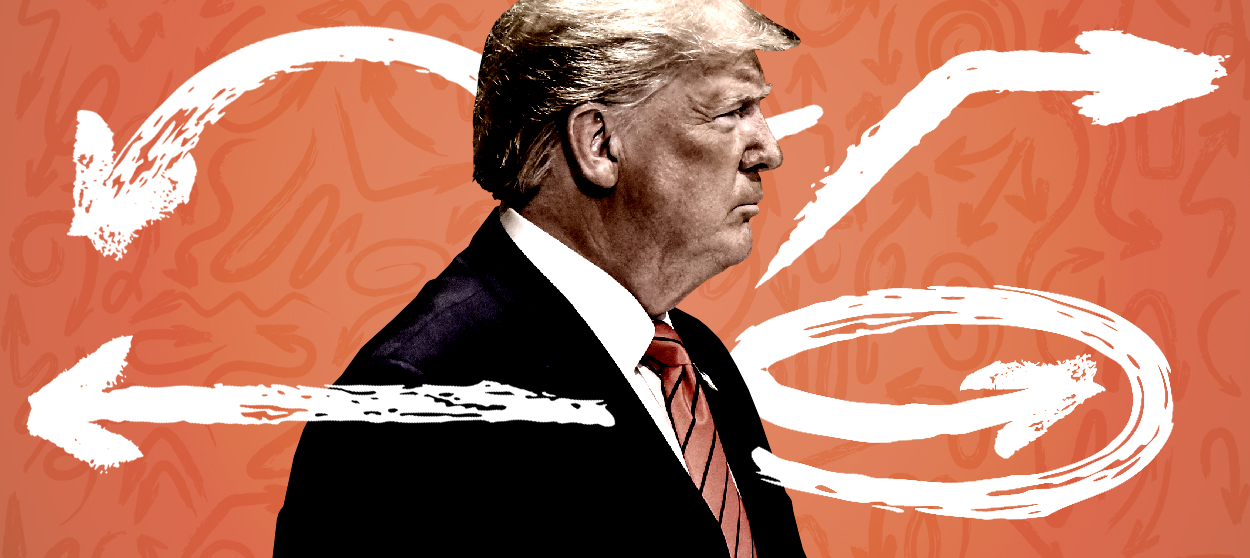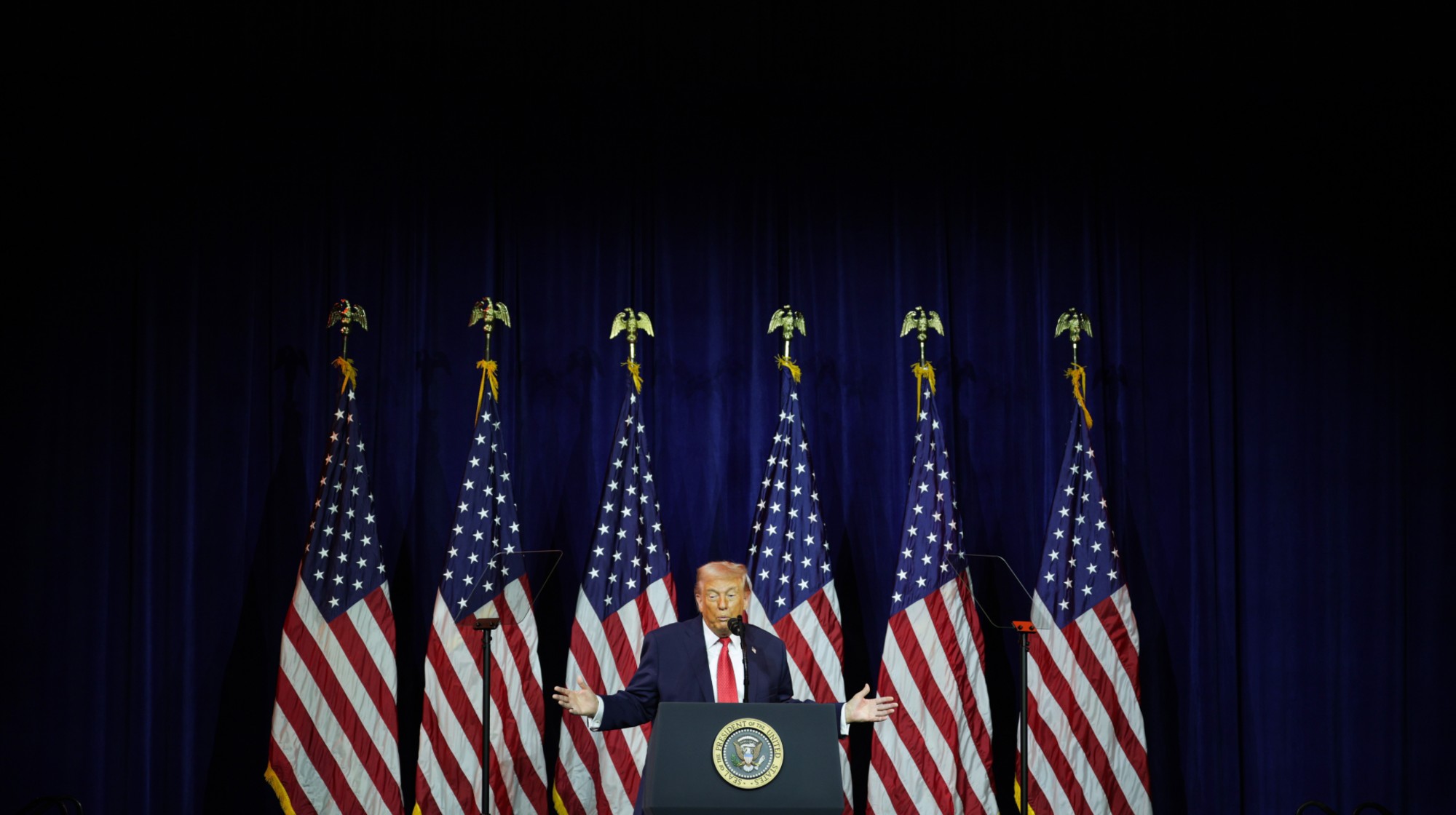The 4 impeachment scenarios
How an impeachment inquiry is likely to play out — and what it would mean for Donald Trump


A free daily email with the biggest news stories of the day – and the best features from TheWeek.com
You are now subscribed
Your newsletter sign-up was successful
House Speaker Nancy Pelosi on Tuesday announced a formal impeachment inquiry against President Trump. Though a contingent of congressional Democrats have long pushed for impeachment proceedings on a variety of bases, it was allegations that Trump coerced the president of Ukraine into investigating the Biden family which finally overcame Pelosi's longstanding resistance to the idea. Now that the process is underway, there are four ways it can go.
1. There's an inquiry but no impeachment.
This is the bare minimum scenario following Pelosi's announcement. The investigation will proceed, but it may not produce enough evidence to warrant drawing up and/or voting on articles of impeachment.
The Week
Escape your echo chamber. Get the facts behind the news, plus analysis from multiple perspectives.

Sign up for The Week's Free Newsletters
From our morning news briefing to a weekly Good News Newsletter, get the best of The Week delivered directly to your inbox.
From our morning news briefing to a weekly Good News Newsletter, get the best of The Week delivered directly to your inbox.
Impeachment proper is a sort of indictment; it is analogous, in ordinary legal matters, to being charged with a crime, not to being convicted. The House of Representatives has "the sole power of impeachment," per the Constitution, which means the House acts like a grand jury deciding whether to indict. Regular grand juries are notoriously easy to convince to bring an indictment, and historically presidential impeachment inquiries (there have only been three, against Presidents Andrew Johnson, Richard Nixon, and Bill Clinton) have resulted in affirmative impeachment votes. Johnson and Clinton were impeached, and Nixon almost certainly would have been had he not preemptively resigned.
Could Trump run for re-election? In this scenario, absolutely. In fact, as my colleague Matthew Walther has argued, an impeachment inquiry which does not successfully run Trump out of politics once and for all may be a strategic boon to his 2020 campaign. If a Democratic House majority can't be persuaded to impeach, Trump will endlessly tout the inquiry as proof positive of "PRESIDENTIAL HARASSMENT."
2. The House impeaches, then Trump resigns.
Our second option is a variant of the Nixon play: With an impeachment vote pending or accomplished (in Nixon's case, articles were approved in committee but not yet the full House), Trump could resign. As it would allow him to endlessly deny wrongdoing and claim political persecution until the day he dies, this option may be appealing to the president.
A free daily email with the biggest news stories of the day – and the best features from TheWeek.com
Could Trump run for re-election? Legally yes, but it would be extremely odd, and it is difficult to imagine Republican leadership — let alone a President (and presumptive GOP nominee) Mike Pence being too happy about the idea. It seems doubtful that the Republican Party would accept a newly resigned president as their 2020 ticket, and it seems equally doubtful that Trump would attempt to run without GOP support. But then, five years ago, I would have deemed wildly implausible about half of what occupies our daily news cycle, so what do I know?
3. Trump is impeached, tried, and acquitted.
In this scenario Trump would follow in the footsteps of Johnson and Clinton, successfully impeached by the House but acquitted in his trial by the Senate. Conviction in the Senate requires a two-thirds majority, which will be a high hurdle while the president's own party continues to control the upper chamber. That said, the Senate unanimously voted Tuesday to have the whistleblower complaint pertaining to Trump's dealings with Ukraine released to congressional intelligence committees, so maybe conviction over this Ukraine business is less of a long shot than it seems at first glance.
Could Trump run for re-election? Again yes, and again it could work to boost his campaign insofar as he can spin the story into his "witch hunt" narrative. However, that tactic could prove difficult to execute if, unlike in the first scenario, the House inquiry turns up evidence enough to convince independent and swing voters of Trump's corruption.
4. Trump is convicted.
The fourth and final possibility is that the president will be impeached in the House and convicted in the Senate, and that for whatever reason — delusion? False hope? Sheer enjoyment of the fight? — he will refuse to resign through the whole process. If that happens, Trump would be removed from office and Vice President Pence would succeed him.
Could Trump run for re-election? Depending on the exact vote(s) taken in the Senate, he could at least try. The Constitution discusses impeachment in several clauses. The best-known portion is in Article II, Section 4, which approaches the subject from the executive side, noting that the president "shall be removed from office on impeachment for, and conviction of, treason, bribery, or other high crimes and misdemeanors." But impeachment is addressed at greater length in multiple sections of Article I, which details congressional roles and responsibilities. "Judgment in cases of impeachment shall not extend further than to removal from office, and disqualification to hold and enjoy any office of honor, trust or profit under the United States," it says, "but the party convicted shall nevertheless be liable and subject to indictment, trial, judgment and punishment, according to law."
Whether removal from office and disqualification from holding office again must be the subject of separate votes is a matter of some controversy. In two cases, the Senate has held separate votes of removal and disqualification while impeaching judges, which suggests it is possible Trump could be convicted and removed without being separately disqualified from running for re-election. However, even more than with our second option, it is difficult to imagine the Republican Party running a nominee in such circumstances — which in this case would include conviction by the GOP's own Senate majority. So even if re-election were legally feasible, it would approach absolute political impossibility.
Want more essential commentary and analysis like this delivered straight to your inbox? Sign up for The Week's "Today's best articles" newsletter here.
Bonnie Kristian was a deputy editor and acting editor-in-chief of TheWeek.com. She is a columnist at Christianity Today and author of Untrustworthy: The Knowledge Crisis Breaking Our Brains, Polluting Our Politics, and Corrupting Christian Community (forthcoming 2022) and A Flexible Faith: Rethinking What It Means to Follow Jesus Today (2018). Her writing has also appeared at Time Magazine, CNN, USA Today, Newsweek, the Los Angeles Times, and The American Conservative, among other outlets.
-
 Political cartoons for February 15
Political cartoons for February 15Cartoons Sunday's political cartoons include political ventriloquism, Europe in the middle, and more
-
 The broken water companies failing England and Wales
The broken water companies failing England and WalesExplainer With rising bills, deteriorating river health and a lack of investment, regulators face an uphill battle to stabilise the industry
-
 A thrilling foodie city in northern Japan
A thrilling foodie city in northern JapanThe Week Recommends The food scene here is ‘unspoilt’ and ‘fun’
-
 Japan’s Takaichi cements power with snap election win
Japan’s Takaichi cements power with snap election winSpeed Read President Donald Trump congratulated the conservative prime minister
-
 Democrats pledge Noem impeachment if not fired
Democrats pledge Noem impeachment if not firedSpeed Read Trump is publicly defending the Homeland Security secretary
-
 How realistic is the Democratic plan to retake the Senate this year?
How realistic is the Democratic plan to retake the Senate this year?TODAY’S BIG QUESTION Schumer is growing bullish on his party’s odds in November — is it typical partisan optimism, or something more?
-
 The billionaires’ wealth tax: a catastrophe for California?
The billionaires’ wealth tax: a catastrophe for California?Talking Point Peter Thiel and Larry Page preparing to change state residency
-
 Trump fears impeachment if GOP loses midterms
Trump fears impeachment if GOP loses midtermsSpeed Read ‘You got to win the midterms,’ the president said
-
 Bari Weiss’ ‘60 Minutes’ scandal is about more than one report
Bari Weiss’ ‘60 Minutes’ scandal is about more than one reportIN THE SPOTLIGHT By blocking an approved segment on a controversial prison holding US deportees in El Salvador, the editor-in-chief of CBS News has become the main story
-
 Democrat files to impeach RFK Jr.
Democrat files to impeach RFK Jr.Speed Read Rep. Haley Stevens filed articles of impeachment against Health and Human Services Secretary Robert F. Kennedy Jr.
-
 Has Zohran Mamdani shown the Democrats how to win again?
Has Zohran Mamdani shown the Democrats how to win again?Today’s Big Question New York City mayoral election touted as victory for left-wing populists but moderate centrist wins elsewhere present more complex path for Democratic Party
